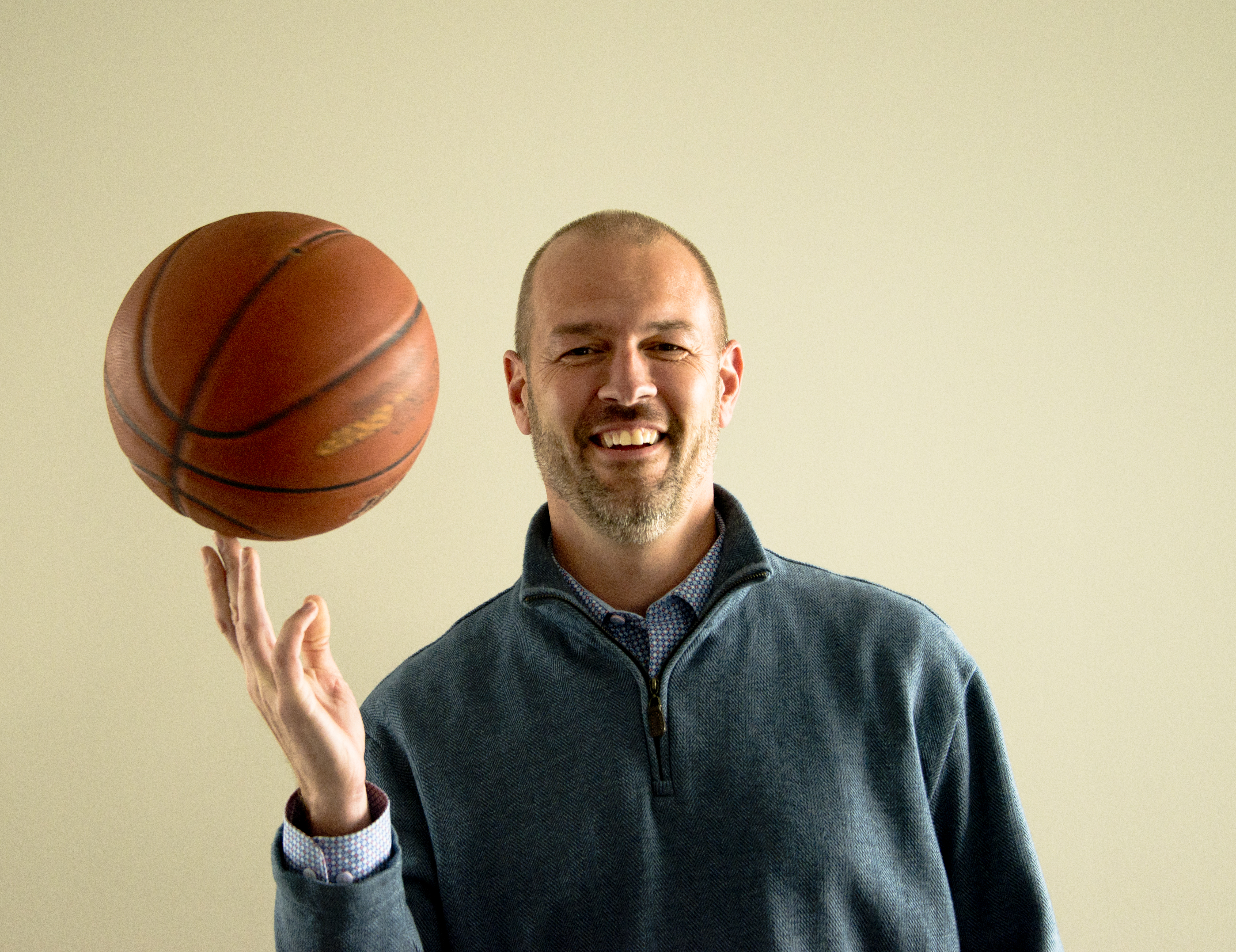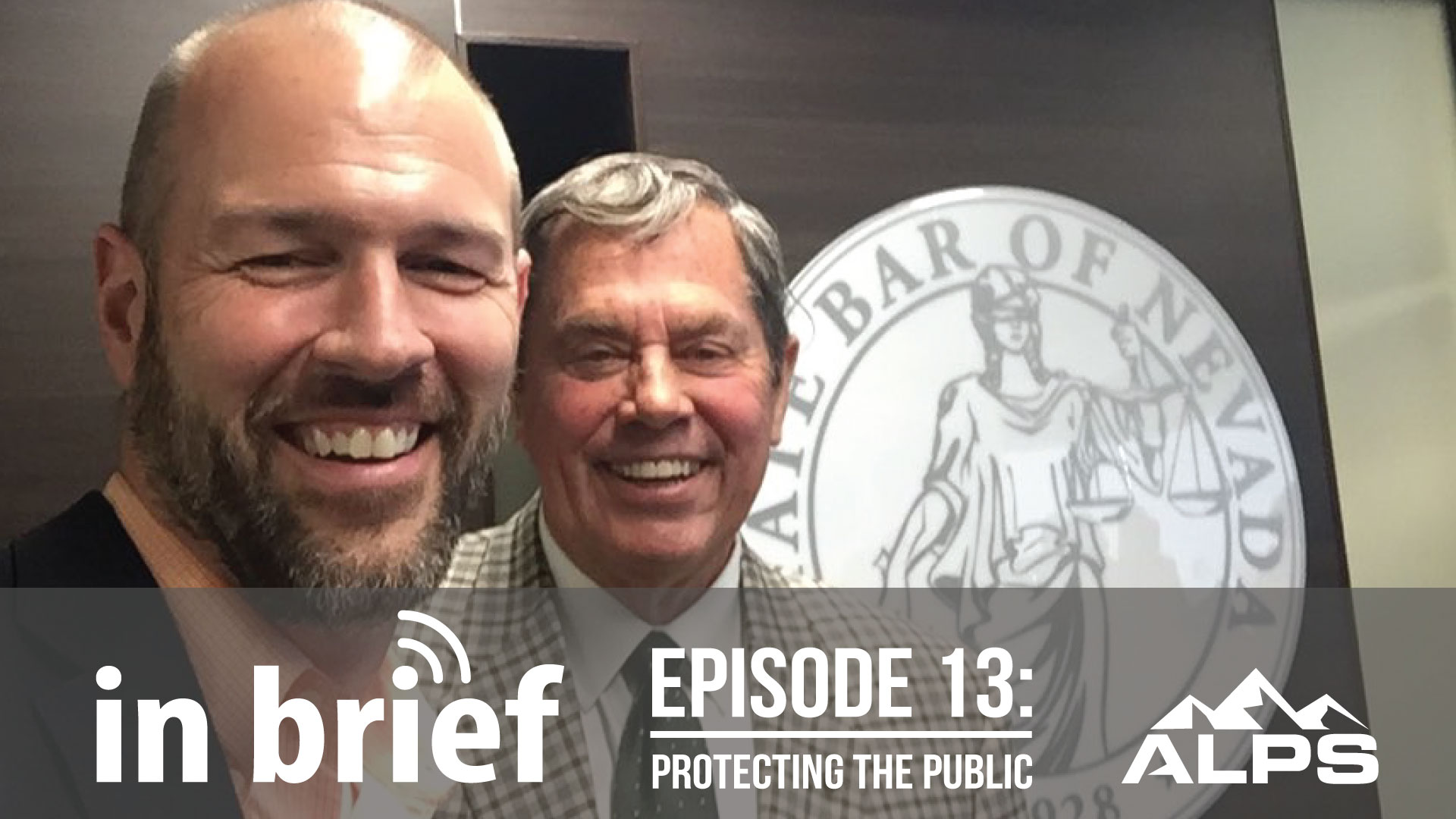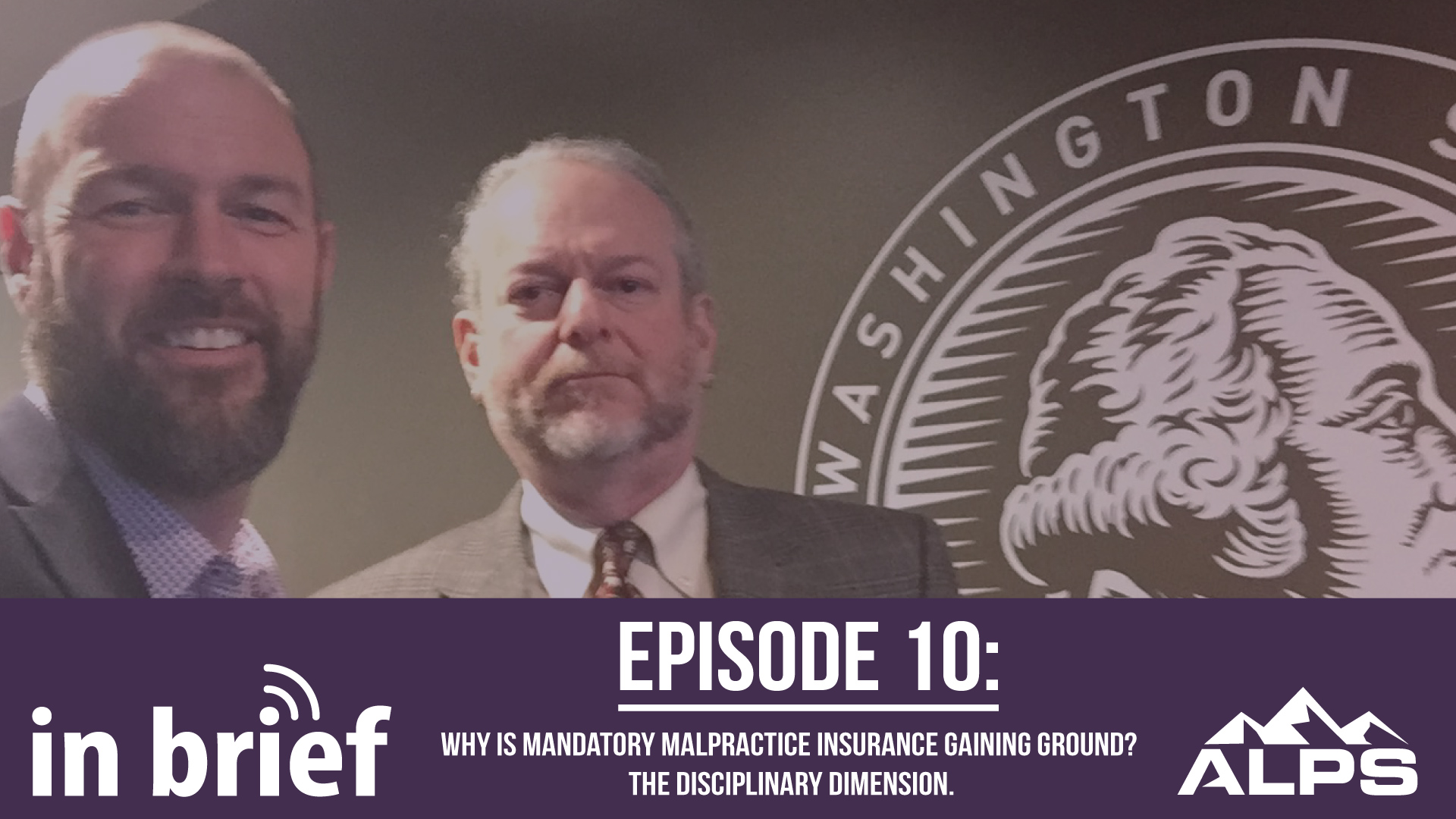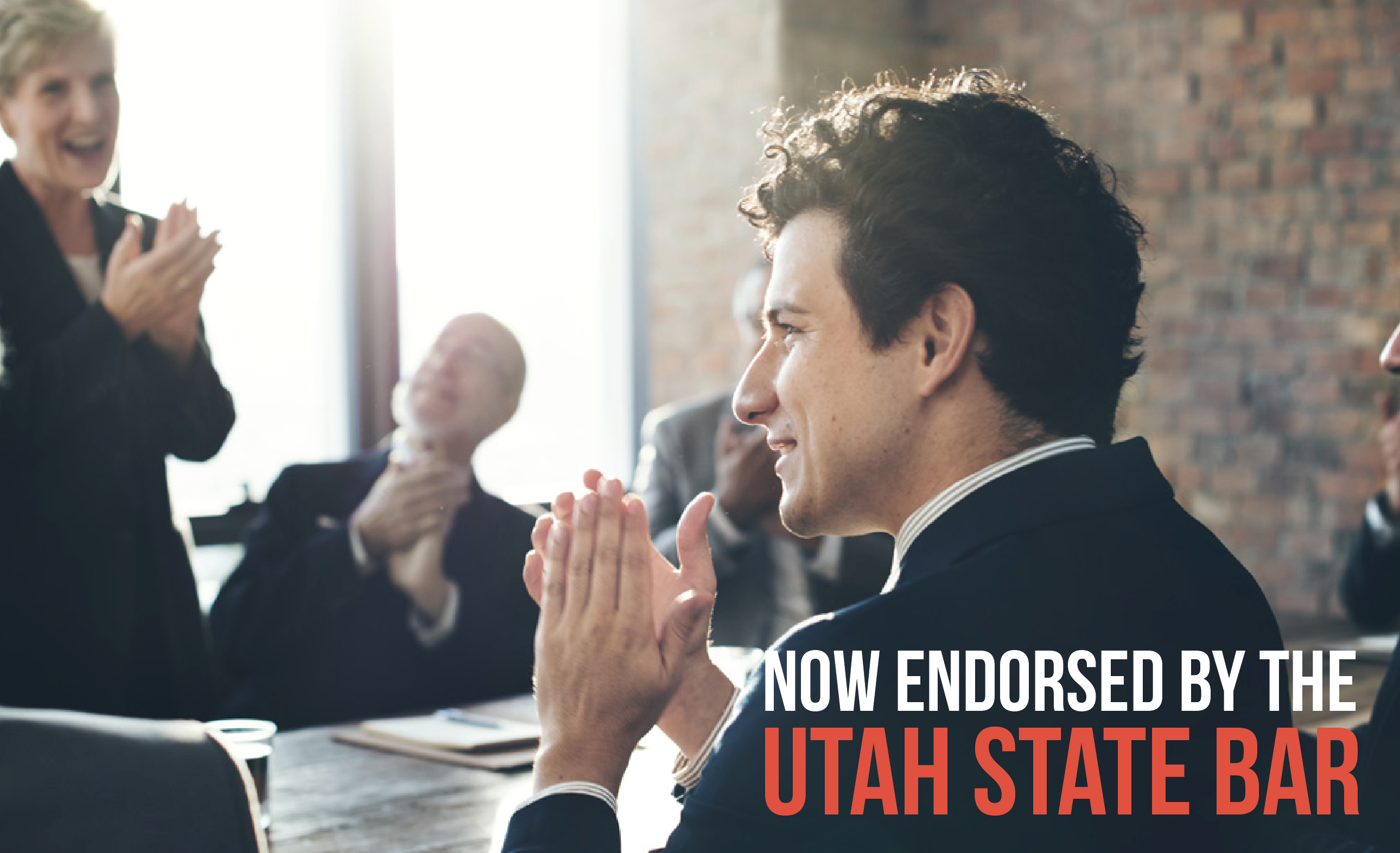9 min read
ALPS In Brief Podcast - Episode 10: Why is mandatory malpractice insurance gaining ground?
ALPS Executive Vice President, Chris Newbold, recently sat down with Doug Ende, the Chief Disciplinary Counsel at the Washington State Bar...
We've crafted solutions tailored to your firm
The world of insurance for law firms can be confusing, and difficult to navigate. We've created this glossary because these common insurance terms should be easy to understand.
9 min read
 Chris Newbold, Chief Operating Officer
:
May 3, 2018 12:00:00 AM
Chris Newbold, Chief Operating Officer
:
May 3, 2018 12:00:00 AM

While he was facilitating the State Bar of Nevada Strategic Planning, ALPS Executive Vice President Chris Newbold, also had the opportunity to sit down with Gene Leverty, Bar President. Nevada is contemplating requiring mandatory malpractice insurance as a condition of licensure. One of the reasons behind the move is to protect the public from engaging with an attorney that is not covered, particularly if missteps are made during that engagement. The conversation also touched on the perceptions of malpractice insurance and how to educate both the public and legal community about why coverage is important for both parties.
This post is part 2 in a series centering on the discussions around mandatory malpractice insurance around the country. Listen to part 1, an interview with Doug Ende with the Washington State Bar about their process and discussions.
ALPS In Brief, The ALPS Risk Management Podcast, is usually hosted by ALPS Risk Manager, Mark Bassingthwaighte. This episode is hosted by Chris Newbold, ALPS Executive Vice President.
Transcript:
CHRIS:
Hello and welcome to ALPS in Brief. This is Chris Newbold, Executive Vice President of ALPS, and today I sit in the bar offices of the State Bar of Nevada with Gene Leverty. Gene is the President of the State Bar of Nevada, lives up in the Reno area. And today our topic is mandatory malpractice insurance.
The State Bar of Nevada has been contemplating perhaps going in the direction of requiring lawyers to maintain malpractice insurance as a condition of licensure. And so Gene, why don’t you talk a little bit about just how this issue arose in Nevada, and where you think it’s heading.
GENE:
Okay. Basically our prior president, Bryan Scott, brought it and said we need to do a task force to consider it. My background with regard to why I thought it was important, and I was chairman of the task force before I was president. The reason I thought it was important goes back to my time on the Clients’ Security Fund, where I found that a lot of the people that came, that had claims for the Clients’ Security Fund, were really negligence cases where the attorneys had failed malpractice insurers. So I thought we needed to look at it in order to see if there was a way that we could protect the public.
So we had to study it from the standpoint of the task force. We studied it in a lot of different ramifications with regard to looking at what other states did, with regard to Oregon, Illinois, Idaho. Then we looked at the unique factors in Nevada that would consider doing what Oregon did or forming a captive. We brought in the insurance commissioner, ALPS, your participation was very helpful. And it boils down to the task force moved, worked very diligently, spent a lot of time because there’s a lot of elements, and we came to the conclusion that it should be mandatory.
Now, in Nevada, we have statistics that we could look at because attorneys have to report whether or not they have malpractice. And if they don’t. Although it’s not verified. We took those statistics and we found out the ones that were honest and reported that they did not have insurance was about 15% of the bar. So we’ve started looking at their statistics and asking them questions in a survey to find out why they didn’t have insurance.
And it was surprising. Because though that 15% were not young lawyers, not solo practitioners soloing, but people that had been practicing for 20 years. And so we went into those and asked them why they didn’t think malpractice insurance was necessary. We heard that. Plus we heard people that were against insurance. They came to the task force. Those with patent practices felt the payments were too high. They would move to other states to practice patent law. And we came to the conclusion after listening to the commissioner, companies, everything that mandatory insurance would be recommended to the Supreme Court.
CHRIS:
What are you contemplating at this point in terms of what you’re going to be recommending when it comes to coverage limits and those types of things?
GENE:
Well, the Board of Governors adopted the task force recommendations. The Board of Governors of the State of Nevada. And they recommended that adoption of 250 limits, every lawyer be required to have that in the minimum. At that stage once the Board of Governors accepts it, which I thought was a gigantic contribution to the Bar by the Board of Governors, because they were looking to protect the public for the honor of our profession.
We take that and we turn it into a proposal to present to our Nevada Supreme Court, which is the ultimate rule maker. And we’ve had, in fact you were present at one of our hearings, with regard to the Supreme Court where we were bringing up and trying to push for the ADKT, which we will be shortly presenting to the Supreme Court and we will have a hearing on it.
We do know from a survey that we did of our general membership, where about 10% responded, that there are some that are not in favor of malpractice because they think it’s too costly for solo practitioners. So we have issues and I know in discussions with the Chief Justice, Chief Justice Douglas, that the Bar is concerned about cost. What is the cost?
So I think that we’re moving in a positive direction. It will be presented to the Court. And the way I look at it, I believe we’re doing something to protect the public, the State Bar. And now it will be shortly in the hands of our Nevada Supreme Court, to either act or not act.
CHRIS:
And you said you did a survey of those who don’t carry malpractice insurance. What commonalities did you find amongst that group in terms of just who generally goes without insurance?
GENE:
Interesting. It’s solo. It’s small practitioners. Mostly solo. Who actually, criminal lawyers, okay, didn’t feel like they needed it. And those who’ve been practicing 20 years without a client. They said, Why should I continue paying for insurance? And then there’s a group that says, Well even if you have a claim, the insurance company doesn’t pay. They’ll find a reason to get out. Those were primarily the responses from the 15%.
But, you know, I think that having gone to the task force in Washington, and talking and getting letters from the California task force, about malpractice. We all are looking at the same issues. We all have about the same numbers of uninsured. And those uninsureds pretty much say the same thing.
But there’s a movement to consider it. I really think from serving on the Clients’ Security Fund and seeing how many people were really hurt by attorneys who had no malpractice insurance that the time has come to protect the public.
CHRIS:
And that’s your principal position is that we, as a soft regulating profession, have a responsibility to insure that our lawyers, in the event they make a mistake, there’s a remedy for the client?
GENE:
Absolutely. But I also believe that by protecting the public we’re honoring our profession. Because our profession is hurt by those attorneys that don’t have, when they commit negligence, don’t have a remedy for their client. And you can’t continue as a profession to be respected if you don’t help the public.
CHRIS:
And how does mandatory malpractice, how does that requirement fall within the mission of your organization, the State Bar of Nevada?
GENE:
It’s one of our ultimate missions is to protect the public. So to serve our membership and protect the public is our goal. With regard to serving the public by protecting them with regard to malpractice, trust accounts, those are important. And what we want to do is educate the lawyer to know how best to protect the public. What do we do for our profession, what do we serve them by? We serve them by, they will have more respect by the people that they serve.
CHRIS:
You’ve obviously now studied this issue pretty in depth over the course of the last year, and obviously you have experience in the insurance sector. What have you learned as part of the process that maybe surprised you as you went through this particular issue?
GENE:
I was surprised that if you were in business, that people were in business without insurance. I saw it a little bit, but I didn’t know. I think it’s even greater than the 15% that are honest. When you get down to it, I think insurance, you buy it in case you make a mistake. But you hope you don’t. And my background, I was a regulator of insurance in Nevada. My practice is insurance. I believe that insurance does the right thing. And I think it’s necessary. It’s to avoid risk.
CHRIS:
And there’s only two states now that require mandatory malpractice insurance. Does it surprise you? Or do you think that the public has a reasonable expectation that most lawyers have malpractice insurance?
GENE:
I believed that at the beginning until in preparation for our convention in Chicago in July. I worked with a focus group. I brought in a friend who, I use focus groups for trials. I said, I want to do some study on this. Surprisingly, surprisingly people, the focus groups, they were concerned if their lawyer had insurance. They thought that maybe that would demonstrate that maybe he needed it, versus praising the lawyer that had it.
The next question is, would you ask your lawyer if he had malpractice insurance? And their answer was, No, because then he’d think I was going to sue him. Now we all believe that you have to have auto insurance to drive. Why shouldn’t you have to have malpractice insurance to practice law. It seems to be reasonable. It’s related. Doctors have to have malpractice insurance. Why shouldn’t lawyers? And yet, the public is not educated as to what exactly lawyers have or don’t have. But it’s really surprised me that they believe that a good lawyer doesn’t need malpractice insurance.
CHRIS:
Is it common in most other professional fields that there is some requirement of malpractice insurance?
GENE:
Yeah. With regard to doctors. My brother-in-law is a doctor. He’s also on the Medical Board. Yeah, doctors have to have malpractice insurance to practice with regards to various hospitals. So they do have malpractice insurance, okay? I don’t know about other professions. But I think that the public believes that doctors have malpractice insurance. So I’m not saying our focus group is absolutely correct because we only did a few focus groups. But I was surprised by the results.
CHRIS:
Well, Gene, obviously you’re preparing now your support for moving toward the Nevada Supreme Court in terms of some type of a decision. What’s that process look like? And what do you think the timeline looks like?
GENE:
We held back the malpractice while we pushed forward on the random trust accounts. That ADKT has been heard by our Supreme Court. So we will be shortly presenting to the Supreme Court what we refer to as an ADKT on malpractice insurance. Having met with the Chief Justice, which we do on a regular basis, of the Nevada Supreme Court, his expressed interest is in the cost. What is it going to cost? And basically putting my head around the cost comes down to basically 85% of our Bar has malpractice insurance.
So we’re not talking about the 85%, what it’s going to cost them. We’re talking about what the cost is to the 15% that are currently uninsured. And I don’t think that that cost is going to be that substantial. Because we have had quotes with regard to that. I believe that even in Las Vegas, which has a higher incidence of claims, I think that we can provide it to every lawyer for about one hour of their time, 250 an hour for a month, to go towards their malpractice should be what it costs. So I think we can sell it to the Court if they’re willing to listen.
CHRIS:
Well, good. And we’ve always argued that for the fractional cost of a billable hour per month the peace of mind in terms of client protection, and lawyer protection frankly, is the right way to go.
GENE:
Actually when you met with our Supreme Court, when you made that statement I picked it up, and I carry it because I think that’s a good message to send.
CHRIS:
Well, Gene, thank you. I appreciate your hard work on this issue. It’s obviously an interesting subject and one that other states are looking at, and keep us posted.
GENE:
Okay. Thank you, Chris.
CHRIS:
Thank you.
Vernon (Gene) Leverty is an active personal injury trial lawyer with 35 years of litigation, trial and negotiation experience. He has held an AV Martindale Hubbell rating (the highest attorney rating) for over 25 years. Gene is a long-time member of Million Dollar Advocates Forum for obtaining a jury verdict over one million dollars. Gene has had several multi-million jury verdicts and settlements. He has a reputation for excellence both in Nevada and nationally.
Because Gene was Chief Deputy Insurance Commissioner of the State of Nevada and then a partner in a Beverly Hills multi-state law firm for ten (10) years representing insurers, he has a special expertise insurance coverage issues, including very complex coverage issues. It is essential that a personal injury trial lawyer fully understand insurance so that the client knows all insurance that may be available to cover the individual’s loss. Gene’s background and experience makes him a valuable resource to his clients, as he provides a unique perspective and understanding of the insurance industry and the manner in which insurance company’s evaluate, investigate, and litigate personal injury claims. Gene’s skill and experience is vital for personal injury cases, including automobile and trucking cases, product liability, premises liability and insurance bad faith.
Gene is licensed to practice in all Nevada and California state courts, and the United States District Court for the State of Nevada, the U.S. Central District of California, the U.S. Eastern District of California, the U.S Northern District of California, the U.S. Southern District of California, District Court (Florida), U.S. District Court of Appeals (9th Circuit) and the United States Supreme Court. He earned his Juris Doctor Degree (J.D.) from the University of the Pacific, McGeorge School of Law.
Gene was the Chief Deputy Insurance Commissioner for the State of Nevada from 1972-1979. In 1979, he joined the law firm of Miller & Daar as a partner, with offices in Beverly Hills, San Francisco, Milwaukee, Seattle and Reno. Miller & Daar was a highly specialized insurance law firm with the principals being former Insurance Commissioners.
Gene was elected in July 2015 the Vice-President of the Nevada State Bar Association, the governing authority for the Nevada legal profession. He now serves at Bar President. He has served on the Board of Governors of the Nevada State Bar for 5 years. Mr. Leverty was a member of the State Bar of Nevada Insurance Standing Committee from 1977-1991, and was the Chairman of that committee from 1977-1980. The State Bar of Nevada on May 31, 1991, granted him the Award of Special Recognition and it awarded him the 2015 Medal of Justice Award.
ALPS In Brief Podcast Intro/Outro Music: Walk In The Park by Audionautix is licensed under a Creative Commons Attribution 4.0 license. https://creativecommons.org/licenses/by/4.0/
Artist: http://audionautix.com/
Chris L. Newbold is Executive Vice President of ALPS Corporation and ALPS Property & Casualty Insurance Company, positions he has held since 2007. As Executive Vice President, Chris oversees ALPS business development team, sales strategy and served as ALPS’ chief liaison into the bar association community until 2023. Externally within legal circles, Chris is a recognized nationally based on his roles as a strategic planning facilitator to bar associations and bar foundations, his leadership work in the lawyer well-being movement and his work advising states regulators and / or bar associations exploring the merits of implementing mandatory malpractice insurance requirements or stricter client disclosure rules. On the strategic planning front, Chris’ lawyer credentials, knowledge of legal industry trends and keen observations into bar association relevance catapulted him into desired facilitator in legal conversations nationally. Chris' unique and innovative strategic planning approach have resulted in his leading retreats and legal conversations at the national, state and local levels, including with State Bars in Maine, Vermont, Virginia, Kansas, South Dakota, North Dakota, Montana, Idaho, Wyoming, Nevada, the U.S. Virgin Islands, as well as the National Conference of Women’s Bar Associations. On the issue of lawyer well-being, Chris has been at the epicenter of discussion both strategically and as an advocate. As co-author of the movement launching 2016 report The Path to Lawyer Well-Being: Practical Recommendations for Positive Change, his leadership as co-chair of the National Task Force on Lawyer Well-Being, his participation on the ABA’s Working Group to Advance Well-Being in the Legal Profession, his role as co-host The Path to Well-Being in Law podcast, and his time as President of The Institute of Well-Being in Law Chris has been at the forefront of a movement intent on creating a culture shift in the legal profession, and advancing personal and professional satisfaction in all sectors of legal life. Chris has also been active nationally counseling State bar associations and regulators on the viability of requiring lawyers to maintain malpractice insurance as a condition of licensure. Given Chris’ insurance industry knowledge, particularly within small firms and solo practitioners, his insights have been additive to the conversations in states like Nevada, Washington, California and Idaho. Chris is also well versed in alternatives to mandatory insurance like client disclosure rules. Chris received his law degree from the University of Montana School of Law in 2001 and holds a bachelor’s degree from the University of Wisconsin-Madison (1994). Following his graduation from law school, he served one year as a law clerk for the Honorable Terry N. Trieweiler of the Montana Supreme Court. After his clerkship, he launched his ALPS career as President and principal consultant of ALPS Foundation Services, a non-profit fundraising and philanthropic management consulting firm. In that capacity, he authored The Complete Guide to Bar Foundations in conjunction with the National Conference of Bar Foundations. Outside of the law, Chris is currently chair of the board of directors of the University of Montana Alumni Association, has authored two children’s book about collegiate mascots (The Big Bucky Badger Mystery (Wisconsin) and The Wild Wolf Pack Mystery (Nevada)) and enjoys his Montana lifestyle with his wife, Jennifer, and their three children, Cameron, Mallory and Lauren.

9 min read
ALPS Executive Vice President, Chris Newbold, recently sat down with Doug Ende, the Chief Disciplinary Counsel at the Washington State Bar...

11 min read
If you are not already aware, ALPS proudly partners with Clio, the easy-to-use cloud-based law practice management software company with over...

3 min read
Effective July, 1, the Utah State Bar announced its exclusive endorsement of ALPS to meet the malpractice insurance needs of its members. The Bar...